Lesson 29: Modifying Themes
/en/powerpoint2013/finalizing-and-protecting-presentations/content/
Introduction
Let's say you really like the style of a theme, but you'd like to experiment with different color schemes. That's not a problem: You can mix and match colors, fonts, and effects to create a unique look for your presentation. If it still doesn't look exactly right, you can customize the theme any way you want.
Optional: Download our practice presentation.
To select new theme colors:
If you don't like the colors of a particular theme, it's easy to apply new theme colors; everything else about the theme will remain unchanged.
- From the Design tab, click the drop-down arrow in the Variants group.
 Clicking the drop-down arrow
Clicking the drop-down arrow - Select Colors, then hover the mouse over the different theme colors to see a live preview.
- Select the desired theme colors.
 Choosing new theme colors
Choosing new theme colors - The presentation will update to show the new theme colors.
To customize theme colors:
Sometimes you might not like every color included in a set of theme colors. It's easy to change some or all of the colors to suit your needs.
- From the Design tab, click the drop-down arrow in the Variants group.
- Select Colors, then click Customize Colors.
 Clicking Customize Colors
Clicking Customize Colors - A dialog box will appear with the 12 current theme colors. To edit a color, click the drop-down arrow and select a different color. You may need to click More Colors to find the exact color you want.
 Selecting a custom color
Selecting a custom color - In the Name: field, type the desired name for the theme colors, then click Save.
 Naming a set of custom colors
Naming a set of custom colors - The presentation will update to show the new custom theme colors.
With some presentations, you may not notice a significant difference when changing the theme colors. For example, a textured background will not change when theme colors are changed. When trying different theme colors, it's best to select a slide that uses several colors to see how the new theme colors will affect your presentation.
To select new theme fonts:
It's easy to apply a new set of theme fonts without changing a theme's overall look. The built-in theme fonts are designed to work well together, which can help to unify your presentation.
- From the Design tab, click the drop-down arrow in the Variants group.
 Clicking the drop-down arrow
Clicking the drop-down arrow - Select Fonts, then hover the mouse over the different theme fonts to see a live preview.
- Select the desired theme fonts.
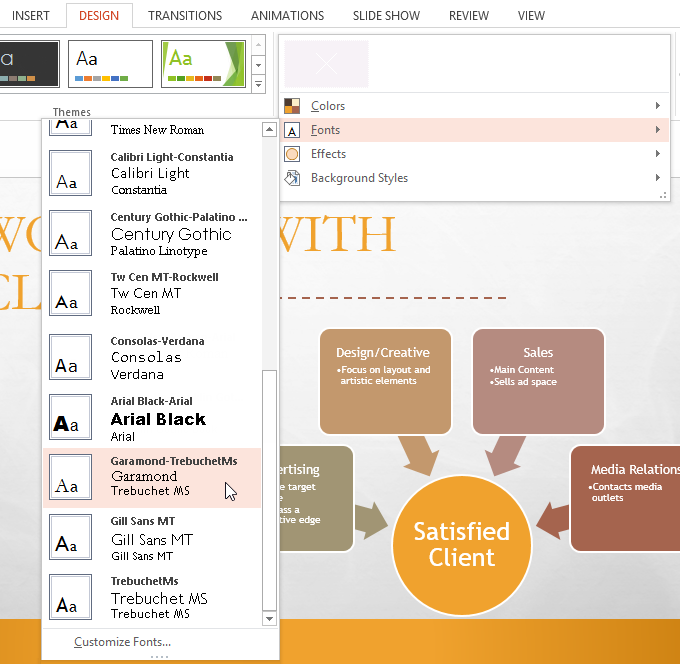 Selecting new theme fonts
Selecting new theme fonts - The presentation will update to show the new theme fonts.
To customize theme fonts:
If you have specific fonts in mind for a presentation, it's easy to choose your own theme fonts.
- From the Design tab, click the drop-down arrow in the Variants group.
- Select Fonts, then click Customize Fonts.
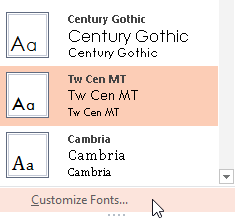 Clicking Customize Fonts
Clicking Customize Fonts - A dialog box will appear with the two current theme fonts. To change the fonts, click the drop-down arrows and select the desired fonts.
- In the Name: field, type the desired name for the theme fonts, then click Save.
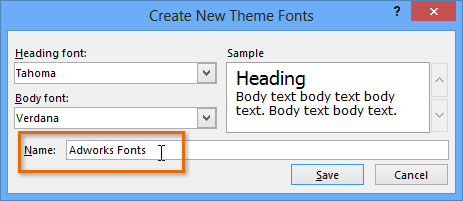 Customizing theme fonts
Customizing theme fonts - The presentation will update to show the new custom theme fonts.
Changing the theme fonts will not necessarily update all text in your presentation. Only text using the current theme fonts will update when you change the theme fonts.
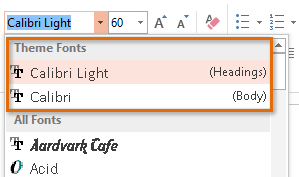 Current Theme Fonts
Current Theme Fonts To select new theme effects:
PowerPoint makes it easy to apply new theme effects, which can quickly change the appearance of shapes in your presentation.
- From the Design tab, click the drop-down arrow in the Variants group.
 Clicking the drop-down arrow
Clicking the drop-down arrow - Select Effects, then hover the mouse over the different theme effects to see a live preview.
- Select the desired theme effects.
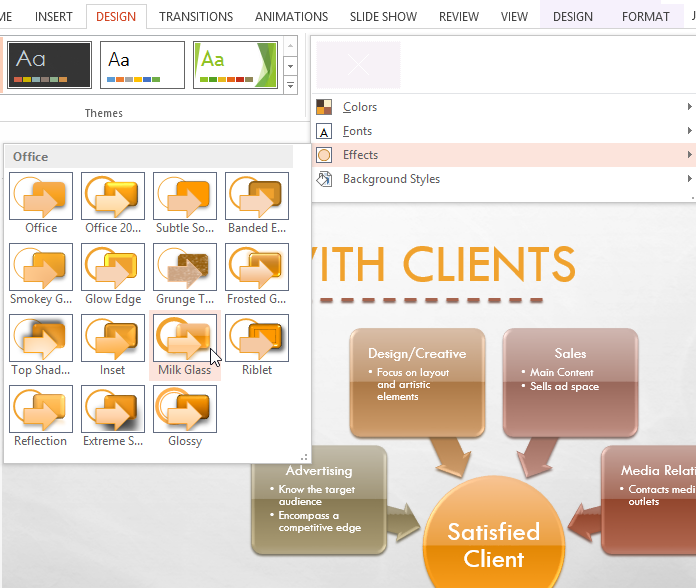 Selecting new theme effects
Selecting new theme effects - The presentation will update to show the new theme effects.
Applying new theme effects will change the different shape styles available from the Format tab when editing a shape or SmartArt graphic.
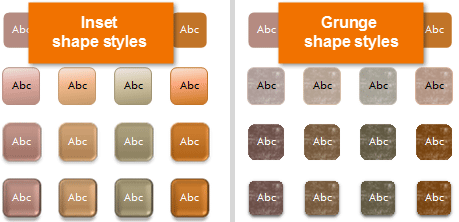 Different shape styles
Different shape stylesBackground styles
To further customize your slides, you can change the background color by choosing a different background style. The available background styles will vary depending on the current theme.
To apply a background style:
- From the Design tab, click the drop-down arrow in the Variants group.
 Clicking the drop-down arrow
Clicking the drop-down arrow - Select Background Styles.
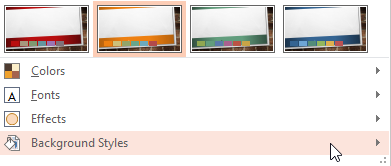 Clicking Background Styles
Clicking Background Styles - Select the desired style. The available styles will change depending on the current theme colors.
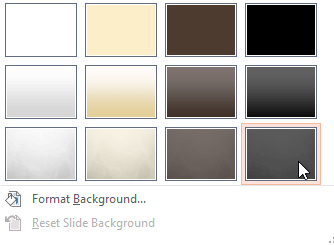 Choosing a background style
Choosing a background style - The new background will appear in each slide of your presentation. As you can see in the example below, changing the background style will not affect background textures.
 The old and new background styles
The old and new background styles
If you want even more control over the background, click the Format Background command on the Design tab.
 Clicking the Format Background command
Clicking the Format Background commandDifferent themes also include different slide layouts and background graphics. We'll talk about how to customize these in the Slide Master View lesson.
Saving custom themes
Once you've found settings you like, you may want to save the theme so you can use it in other presentations. If you only want to use the theme in the current presentation, you won't need to save it.
To save a theme:
- From the Design tab, click the drop-down arrow in the Themes group.
 Clicking the drop-down arrow
Clicking the drop-down arrow
- Click Save Current Theme.
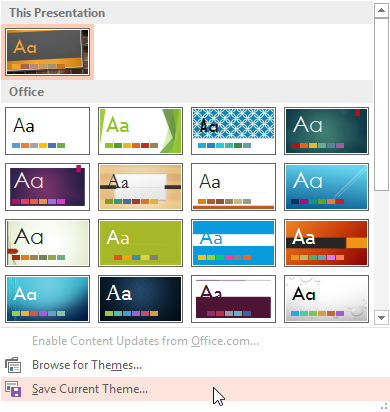 Clicking Save Current Theme
Clicking Save Current Theme - A dialog box will appear. Type a file name, then click Save.
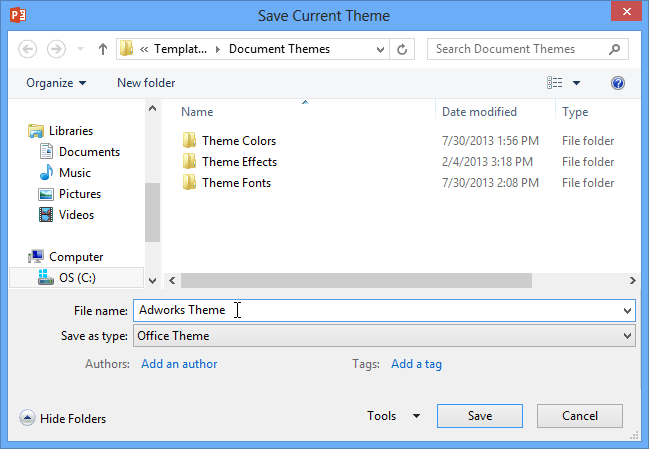 Saving a theme
Saving a theme - When you click the drop-down arrow in the Themes group, you'll see the custom theme under Custom.
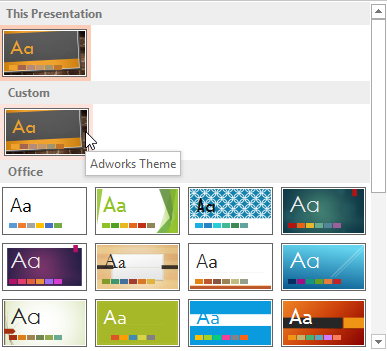 The added custom theme
The added custom theme
Custom themes have another unique and powerful feature: Any custom theme you save in PowerPoint can actually be used in other Microsoft Office applications, such as Word and Excel.
Challenge!
- Open an existing PowerPoint presentation. If you want, you can use our practice presentation.
- Apply the Paper theme colors.
- Select another set of theme colors.
- Try selecting different theme fonts to find ones that look good with the presentation.
- Change the background style.
/en/powerpoint2013/slide-master-view/content/


 Clicking the drop-down arrow
Clicking the drop-down arrow Choosing new theme colors
Choosing new theme colors Clicking Customize Colors
Clicking Customize Colors Selecting a custom color
Selecting a custom color Naming a set of custom colors
Naming a set of custom colors Clicking the drop-down arrow
Clicking the drop-down arrow Selecting new theme fonts
Selecting new theme fonts Clicking Customize Fonts
Clicking Customize Fonts Customizing theme fonts
Customizing theme fonts Current Theme Fonts
Current Theme Fonts Clicking the drop-down arrow
Clicking the drop-down arrow Selecting new theme effects
Selecting new theme effects Different shape styles
Different shape styles Clicking the drop-down arrow
Clicking the drop-down arrow Clicking Background Styles
Clicking Background Styles Choosing a background style
Choosing a background style The old and new background styles
The old and new background styles Clicking the Format Background command
Clicking the Format Background command Clicking the drop-down arrow
Clicking the drop-down arrow Clicking Save Current Theme
Clicking Save Current Theme Saving a theme
Saving a theme The added custom theme
The added custom theme